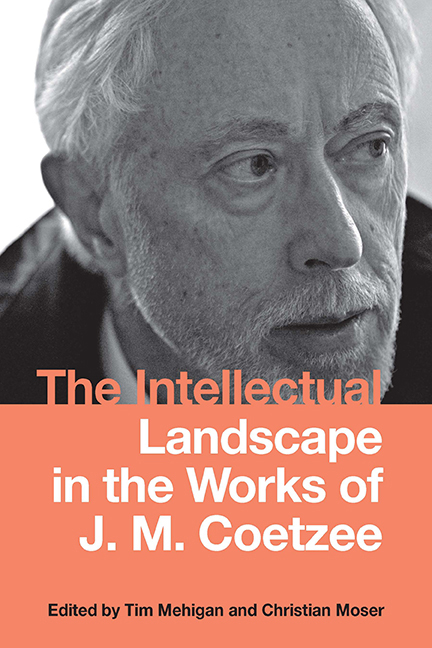Book contents
- Frontmatter
- Contents
- Acknowledgments
- Introduction: Coetzee's Intellectual Landscapes
- Part I Truth and Justification
- Part II Objectivity and Communication
- Part III Convergence of Interpretative Horizons and Moral Solidarity
- 11 Coetzee as Academic Novelist
- 12 Character and Counterfocalization: Coetzee and the Kafka Lineage
- 13 J. M. Coetzee's South African Intellectual Landscapes
- 14 Philosophical Fiction? On J. M. Coetzee's Elizabeth Costello
- 15 Cosmopolitanism, the Range of Sympathy, and Coetzee
- Notes on the Contributors
- Index
13 - J. M. Coetzee's South African Intellectual Landscapes
from Part III - Convergence of Interpretative Horizons and Moral Solidarity
Published online by Cambridge University Press: 03 July 2019
- Frontmatter
- Contents
- Acknowledgments
- Introduction: Coetzee's Intellectual Landscapes
- Part I Truth and Justification
- Part II Objectivity and Communication
- Part III Convergence of Interpretative Horizons and Moral Solidarity
- 11 Coetzee as Academic Novelist
- 12 Character and Counterfocalization: Coetzee and the Kafka Lineage
- 13 J. M. Coetzee's South African Intellectual Landscapes
- 14 Philosophical Fiction? On J. M. Coetzee's Elizabeth Costello
- 15 Cosmopolitanism, the Range of Sympathy, and Coetzee
- Notes on the Contributors
- Index
Summary
SPEAKING OF HIS South African contemporaries Breyten Breytenbach, Athol Fugard, and Nadine Gordimer, J. M. Coetzee strikes a distinctly fraternal note: “If I must try to specify in what spirit I read [them], I would say above all it is in a spirit of sympathy. I believe I know from the inside some of what, in their very different ways, they have confronted and sometimes overcome, sometimes failed to overcome.” This sense of Coetzee's sharing “from the inside” the possibilities and limitations facing South African writers extends beyond his immediate contemporaries, reaching across the entire canon of the country's “culture of letters” past and present (to borrow a phrase from his collection of essays on the subject, White Writing: On the Culture of Letters in South Africa).
On occasion, the sense of shared endeavor—even with writers of the distant past—is surprisingly intimate. For example, in the National English Literary Museum in Grahamstown (NELM), where he has deposited the lecture notes from his years of teaching at the State University of New York in Buffalo (1968–71) and the University of Cape Town (1972–2001), among papers (1972–2001) relating to a course on comparative South African literature taught in 1993 there is a page of reflections on Olive Schreiner. The direction of these notes is not that they seek to understand Schreiner's work per se, but that Schreiner is a mirror in which Coetzee reflects on his own career. The notes are therefore autobiographical and worth following in some detail. On the evidence of African Farm, Coetzee writes, Schreiner was “a young person, not so much testing ideas as testing for the first time the possibility that ideas can explain reality. Later it is more a matter of deploying ideas. Generally, it is not important that writers have good ideas. Rather, it is a matter of seeing a mimesis of intellectual engagement.” Since the worth of a writer's ideas is less important than what she does with them, there are further questions: what is the source of the power that makes the mimesis credible, and how well does the writer understand that power, to ensure its continued renewal? He believes that Schreiner mistook the source of her creativity.
- Type
- Chapter
- Information
- The Intellectual Landscape in the Works of J. M. Coetzee , pp. 274 - 293Publisher: Boydell & BrewerPrint publication year: 2018
- 1
- Cited by

